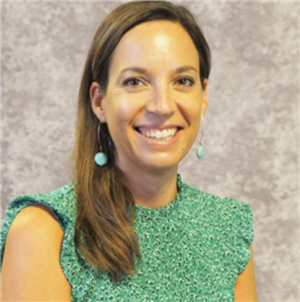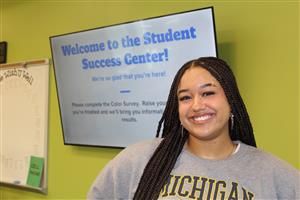- Maplewood Richmond Heights School District
- Alternative Programs
-
 Melissa Fuoss is the MRH High School Alternative Humanities Teacher.
Melissa Fuoss is the MRH High School Alternative Humanities Teacher. "The MRH School District recognizes that there are various learning styles in our diverse population. MRH Alternative Programs are designed to help 7-12 students who have demonstrated difficulties in mainstream education. The programs have been in place since the 2002-2003 school year. We are committed to educating and supporting all children.
The mission of Alternative Programs is to re-engage the alternative learner through intensive service designed to develop habits of school engagement that reflect the emotional, social, and academic skills necessary for a successful return to the base school.
Traditional instructional techniques may not address the needs of some students. For that reason, every effort is made to provide an individualized program of instruction for each student. Our faculty responds to the unique learning needs of our students by employing a variety of instructional strategies that are experiential and self-directed. Each learner can gain skills necessary for a successful transition back to his or her base school through this process. Our curriculum is integrated and aligned with district and state content area standards. Therefore, our students' educational experience in core courses parallels that of students in the base schools.
The main component is providing a core curriculum for credit recovery or progress to middle school promotion or high school graduation. Remedial support in reading, writing, and math is also provided when indicated by authentic assessments or achievement test scores. Life and Coping Skill classes, one-on-one and small group counseling, and parent involvement opportunities are components also utilized in the program.
The program is administered in two separate facilities: New Visions (for middle school students) and the Student Success Center (for high school students). Typically, students will remain in programming for at least one complete semester so that instruction will be stable and relationships can be built between staff and students.
With questions, reach me at melissa.fuoss@mrhschools.net or call 314-446-3842."
Alternative Program Descriptions/Process
Placement:
- Building administrators and/or counselors bring a list of possible referrals for Alternative Programs.
- Admin & counseling staff share names with the Student Services Director and educational plans are either started or reviewed.
- Counselors send out intervention surveys to at least two of the student’s teachers.
- Monthly meetings are scheduled to review student concerns and develop interventions and next steps for each student.
- If students are determined as good fits for one of the Alternative Programs, and enrollment is a possibility, students and parents are contacted by a guidance counselor to gauge student interest.
- Parents are contacted, applications are distributed, and intake meetings are scheduled.
 Student Success Center (SSC) / New Visions (NV)
Student Success Center (SSC) / New Visions (NV)An SSC/NV student may be a student who:
- needs targeted academic supports due to failures and credit deficiencies
- would benefit from a smaller social/academic setting
- would benefit from increased social/emotional supports
- desires an alternative placement
SSC/NV placement will be reviewed at the end of each semester in order to evaluate future placement/needs.
Social Academic Growth Experience (SAGE)
A SAGE student may be a student who:
- needs targeted behavior modification in a controlled environment
- is in need of greater emotional support than traditional classrooms/schedules may provide
- has social struggles that are not conducive to other alternative settings until interventions are applied
SAGE interventions will be reviewed at the end of each semester in order to evaluate future placement/needs.
Missouri Options (MO OPTIONS)
A Missouri Options student may be a student who:
- is 17-years-old and a year behind their cohort
- is willing to take the pre-assessment and score at the cusp of not-yet-prepared and somewhat prepared (pre-test needs to occur before May 1st)
- has passed the Missouri Constitution and the Federal Constitution tests
- has passed the following courses: Government, Health, Personal Finance
- has a means of obtaining 15 hours a week through additional class hours, employment, or volunteer/internship
- has at least an 11th grade reading level
Missouri Options interventions will be reviewed at the end of each semester in order to evaluate future placement/need.

